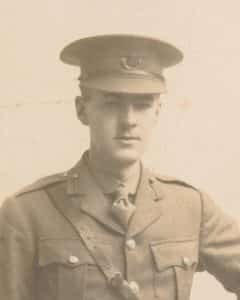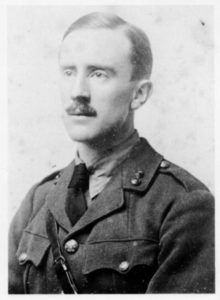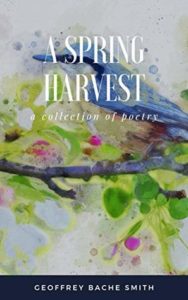At King Edward’s School in Birmingham, J.R.R. Tolkien because close friends with several other boys. He and three others formed what they called the TCBS, or Tea Club, Barrovian Society. The four would regularly meet at Barrow’s Department Store for tea and discussion, mostly about poetry and literature.
The TCBS continued meeting, if irregularly, once the four went to university. Even after they enlisted in World War I, they wrote letters and exchanged poems. Of the four, only two, Tolkien and Christopher Wiseman, survived the war. One who did not was Geoffrey Bache Smith. He managed to survive the horrific, months-long Battle of the Somme (July to October, 1916) only to die in December from a shrapnel wound.

Geoffrey Bache Smith

J.R.R. Tolkien
Tolkien and Wiseman were heartbroken. Both had various poems by Smith in their possession, and several poems in his belongings were sent home to his family. While the war still raged (and he himself recovered from a wound), Tolkien placed himself under an obligation to his dead friends. He gathered together all of Smith’s poems and served as the editor of a volume entitled A Spring Harvest, published in June of 1918 while the war continued. It was an obligation to Smith and to Smith’s parents; one can only imagine how they responded to hold a copy of their dead son’s poetry in their hands.
As Tolkien explains in a note, Smith wrote the poems over a period of years, from 1910 to 1916. He wrote some while he attended Oxford (1913-1915), many during the time he served with the Lancashire Fusilliers (1915-1916). One, “The Burial of Sophocles,” was begun before the war, and Smith continued to write, rewrite, and edit it until his death.
The volume as published includes 50 poems, beginning with a long poem entitled “Glastonbury,” the first of two “legend” poems. It ends with “The Burial of Sophocles” and a short six-line poem, “So we lay down the Pen.”
Smith wrote formal poetry, squarely in the “Edwardian” tradition that was prevalent among the war poets, the group of young men whose poetry published during and after the war helped to frame a generation’s understanding of the war. The volume includes his war poems, but he also wrote about British mythology, nature, music, and other topics.
Only in hindsight can we see the poignancy of Smith writing a tribute to Robert Quilter Gilson, another TCBS member and the first to die in the war. Gilson died early in the Battle of the Somme, in July 1916, and this is the poem that Smith wrote for him.
For R.Q.G.
July 1916

(Seen only of the one all-seeing eye)
Are as unchangeable as the azure sky,
And as fulfilled of infinite mysteries:
Are like a fast-locked castle without keys
Whereof the gates are very strong and high,
Impenetrable, and we poor fools die
Nor even know what thing beyond them is:
O God, by whom men’s lives are multiplied,
Are scattered broadcast in the world like grain,
And after long time reaped again and stored,
O Thou, who only canst be glorified
By man’s own passion and the supreme pain,
Accept this sacrifice of blood outpoured.
A few months later, Smith himself had become part of the “sacrifice of blood outpoured.” His poems in A Spring Harvest are filled with an eloquent beauty, expressed with the keen eye of a poet who loved life and loved his friends.
Tolkien had never promised Smith or his family that he would publish the poems. This was a self-imposed obligation, to honor a close friend, schoolmate, and fellow TCBS member. It was an act of kindness as well as tribute, and it speaks to the young man Tolkien was and the man he remained.
Photo by catton2011, Creative Commons, via Flickr. Post by Glynn Young.
__________________________

“I require all our incoming poetry students—in the MFA I direct—to buy and read this book.”
—Jeanetta Calhoun Mish
- “Horace: Poet on a Volcano” by Peter Stothard - September 16, 2025
- Poets and Poems: The Three Collections of Pasquale Trozzolo - September 11, 2025
- Poets and Poems: Boris Dralyuk and “My Hollywood” - September 9, 2025

Bethany R. says
I’m struck by the words of the featured poem, “For R.Q.G.,” in particular the simile for God’s purposes as being “like a fast-locked castle without keys.”
I love Tolkein’s act of generosity—to not allow his friends’ words to be forgotten by others. He intentionally gathers them for publishing so they too can be, to use Geoffrey Bache Smith’s words, “scattered broadcast in the world like grain,/ And after long time reaped again and stored.”
Sandra Heska King says
“It was an act of kindness as well as tribute.”
I looked up the word “kind” – deliberately doing good to others. And then I thought of the passage in Acts that said Jesus went about doing good. Small acts that sow seeds.
Also what Bethany said.